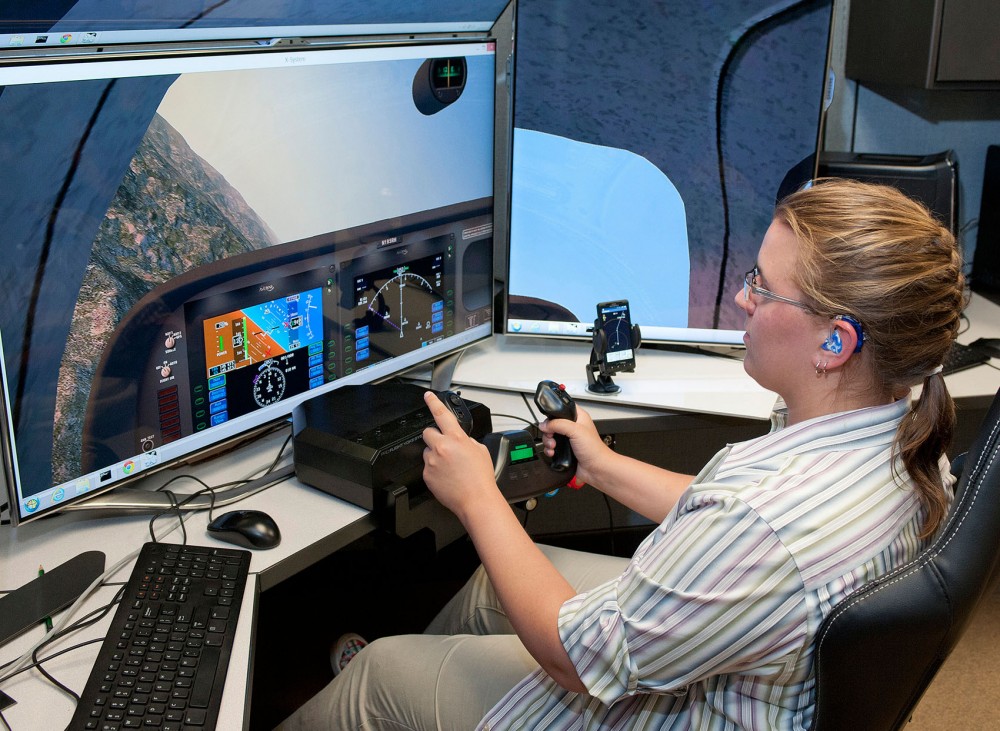Johanna Lucht was born deaf and didn’t know a true language until she was 9 years old.
But after those early years of frustration, the University of Minnesota computer science and engineering senior eventually landed an internship at NASA, developing a collision-avoidance mobile application for pilots at the Dryden Flight Research Center in Edwards, Calif., this summer.
Lucht was born in Germany, where her father worked for the United States government.
There, the deaf community had little to no resources, and the Department of Defense Dependent school she attended didn’t have any interpreters, she said.
Her mother, Julie Lucht, tried to learn sign language from a book, but the two-dimensional signs were only loose interpretations of American Sign Language. Johanna Lucht was able to communicate minimally at home — but at school, no one could speak with her.
“There were times when we did not know what the future held for her at all,” Julie Lucht said, “I think we felt like there was somebody trapped inside there, but we couldn’t get that person out because we didn’t have the language skills.”
When Lucht was 9, her school hired an interpreter, Keith Wann, who said he knew he was in for a challenge when he spelled out his name in sign language and Lucht couldn’t sign it back.
Before Wann could teach Lucht American Sign Language, he had to first get her attention by drawing, telling jokes and even juggling.
“She was so shy and so quiet,” he said. “I was just trying to make her laugh and trying to connect to a kid so I could have
her trust.”
After a few months of learning ASL, Lucht was able to hold her own in conversation and participate in class, Wann said.
Lucht caught up to her grade level in middle school. By high school, she was in honors classes.
When she was 12, the Lucht family moved to Anchorage, Alaska., where Lucht discovered the world of computer science and programming.
“When I was 16, I knew nothing about computers at all,” Lucht said through an interpreter, “like zero, zilch, nothing.”
But around that age, she heard about a summer academy program for the deaf on computer science at the University of Washington.
Although the program was open to those 18 and older, it was willing to consider younger candidates and accepted Lucht. The following year, she returned as a teaching assistant.
At this program and others — including University retreats — Lucht’s leadership qualities and sense of humor stood out, said Laura Wiesner, Lucht’s advisor at the retreats and Frontier Hall residence director.
“Her nature is to take charge,” Wiesner said. “She also doesn’t take herself too seriously or the people around her.”
Lucht first saw the NASA internship, a program for students with disabilities who want to go into the sciences, on Facebook.
She was interested, Lucht said, but life got busy. It wasn’t until multiple emails from her advisor and two more reminders from the College of Science and Engineering that she finally applied.
When she saw her acceptance email, Lucht said she was shocked.
“My brain just about exploded,” she said through an interpreter. “I was looking at my laptop, and I thought, ‘No, that’s not real.’ So I cleaned my glasses, and I looked again.”
Her parents said they were proud and not surprised.
“I was blown away,” her father, Allan Lucht, said.
Worried that NASA would have unrealistic expectations of her or be too serious a work environment, Johanna Lucht said she was nervous to begin her internship there.
But once Lucht got used to the basics of her research, she said she found she could have fun with her work.
Lucht’s mentor at NASA, flight systems engineer Dena Gruca, loved the color orange — so Lucht nicknamed her using the sign for “orange.”
“She asked a lot of good questions and was very good at being a self-starter, taking on any tasks and challenges by herself,” Gruca said.
Lucht finished her research on the collision-avoidance application, and another intern has taken her place to continue it.
Lucht said the internship raised her confidence, and she hopes to work for NASA full-time someday or in a field where she can use technology to improve people’s lives.
“If technology is accessible to everyone, it will impact the world in a big way,” she said. “So I think that is what I want to do.”
Two years ago, Lucht invited Wann, her childhood interpreter, to the University to perform his sign language comedy routine for the school’s deaf community.
Julie Lucht said without Wann, her daughter’s potential could have been locked up forever.
“I got to see her, after not seeing her since third grade, being the brilliant person that she is now,” Wann said. “I’m not surprised where she’s heading; I’m just so glad that she’s going there and being everything she’s capable of.”


